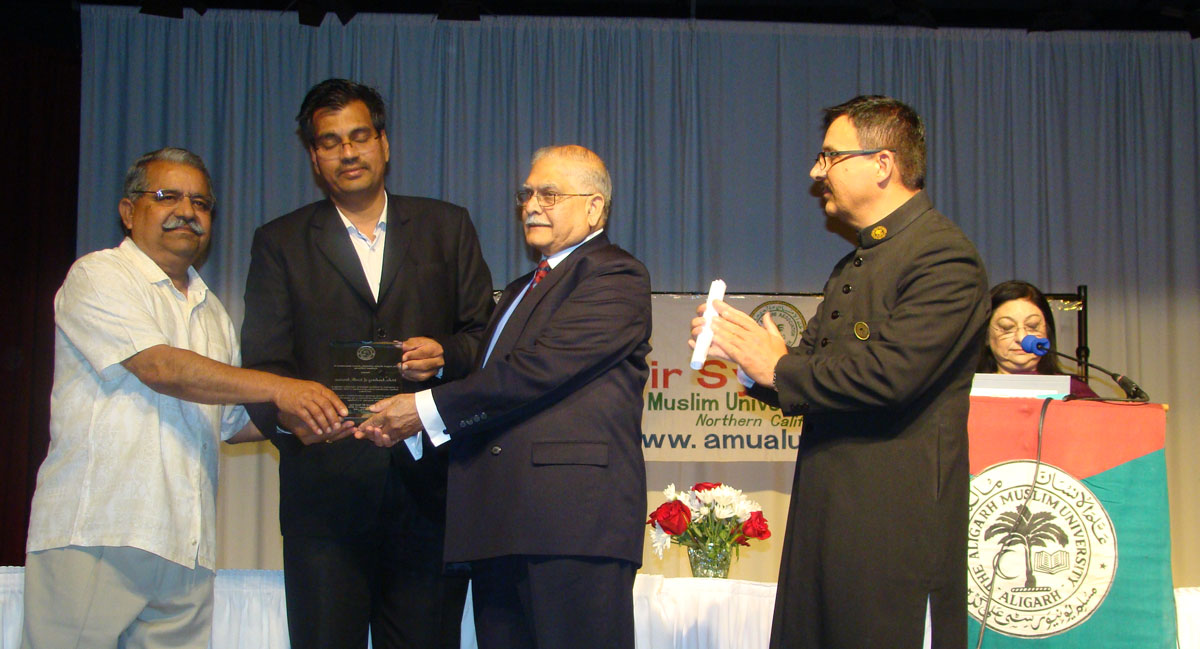SAN FRANCISCO BAY AREA SIR SYED DAY 2016
Sir Syed Day Award for Urdu Academy. (Photos: Ras H. Siddiqui)
The Aligarh Alumni Association of Northern California held its 19th Sir Syed Day program in the San Francisco Bay Area, Aug. 13, keeping in mind both the style and substance that this esteemed institution has retained for well over a century, writes Ras H. Siddiqui. – @Siliconeer #Siliconeer #AligarhMuslimUniversity #AMU #AAANC #AligarhAlumniAssociation #SirSyedDay #IndiaCommunityCenter #ICCMilpitas
This “almost house full’ event held at the India Community Center in Milpitas, Calif., attracted not only dedicated AMU Alumni from the region but also area connoisseurs of fine Urdu poetry and prose. This year was somewhat unique because there was no keynote speech by an outside speaker. The formalities this time were conducted by local officers and friends of the organization themselves. But before we get to the proceedings of the three segments of the program, some background would be helpful here.
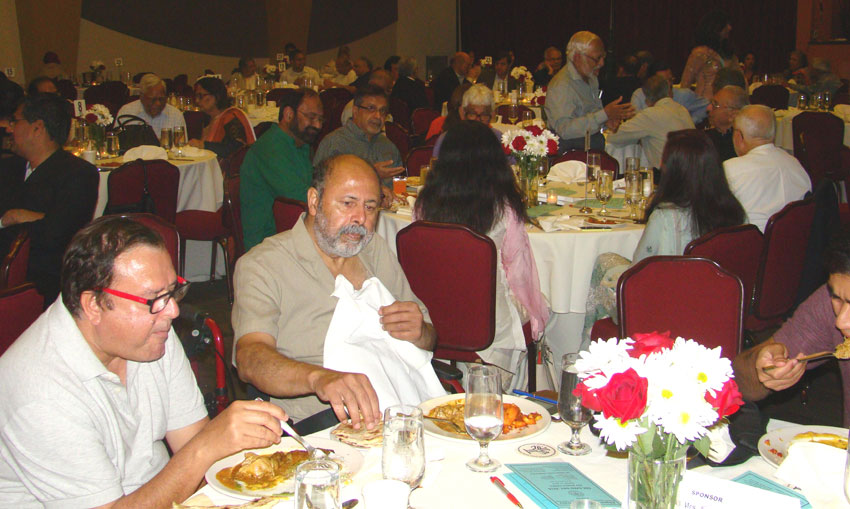
Sir Syed Ahmad Khan was born on October 17, 1817 in Delhi and next year should be his bi-centennial birthday celebration when one expects AMU alumni to hold major events in his honor worldwide. His legacy remains a rich one as he provided India’s Muslims a path towards modern scientific education while most of them remained mired in old traditions unable to compete in the emerging technologies of the time during the late 19th century. After the defeat of 1857, Mughal rule permanently ended in India as it officially became “The Jewel in the Crown” of the British Empire. The Muslims expressed many reasons for their displacement as rulers of Delhi and it was Sir Syed who correctly ascertained that it was the scientific edge that the Europeans has pursued that made them rulers of India. And in spite of resistance from traditionalists, Sir Syed was able to accomplish a major step specifically for his community and for India as a whole by leaving behind an institution of learning (where English was the language of instruction but there was no compromise on local values. In 1877 he founded the Muhammadan Anglo Oriental College (MAO) in Aligarh (patterned on Oxford and Cambridge universities) which was later to become Aligarh Muslim University in 1920. And today it is the graduates of AMU from all religious communities who work and prosper all over the globe. They have not forgotten to support the vision of the founder either as the Aligarh Education Endowment Fund (AEEF) fundraising has become an essential part of this annual program here.
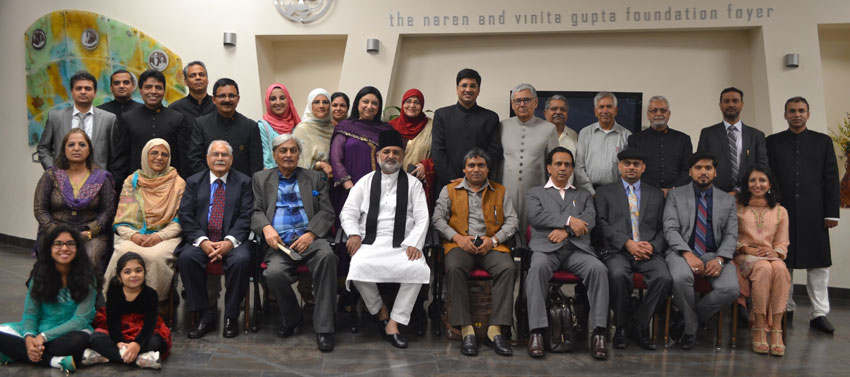
And now to the event itself, the first segment of which was an informal social hour and a fine dinner in the Mughlai tradition. The actual formalities next began with a recitation from the Holy Quran and a brief introduction by segment emcee Amtul Suhail who thanked all sponsors and everyone present for attending. And she lost little time in inviting a smiling Dr. Shaheer Khan to the stage whose quick reference to checkbooks, pledges and credit cards paved the way for the AEEF fundraiser! Armed with slides and aided by a short documentary, details of the worthy effort that the AEEF is conducting to help some struggling or less fortunate in India get their education, Khan said that the work was done with almost zero overhead costs. He explained that the goal was to collect $100,000 annually out of which $60,000 had already been collected and this fundraising was for the remaining $40,000 shortfall. Not only does the AEEF provide scholarships on a merit basis or need to deserving students for schooling but it also aids them in getting into universities to further their education.
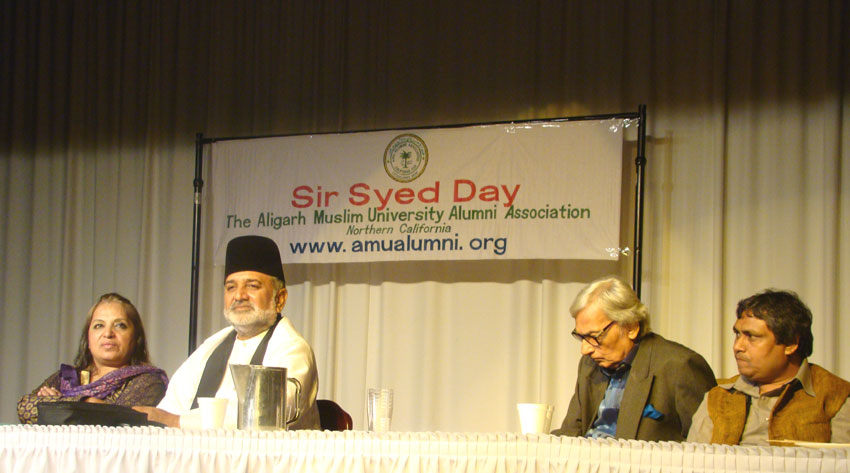
Another significant part of the formalities was the welcome speech delivered by current AMUAA President Suhail Farrukh who started his speech with some moving Urdu poetry directed at Sir Syed and his vision. Farrukh said that we are gathered here to honor Sir Syed and anything one can say about his achievements in such a short period of time just would not be enough. He said that when Sir Syed founded MAO College he had in mind an institution where modernity and tradition (West and East) could co-exist. He explained that this association came into being in 1996 and in the nearly 20 years of its existence it has been the goal here to take Sir Syed’s education mission forward with community support. He also thanked all in attendance and especially the event sponsors for making this possible.
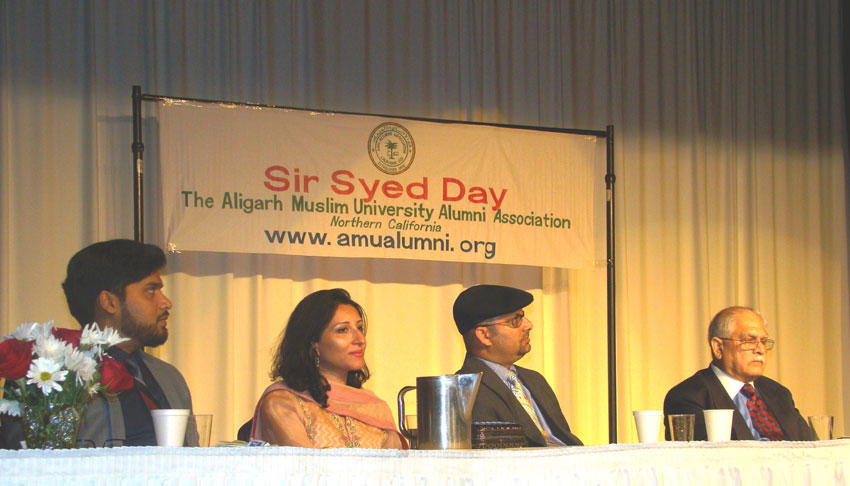
And before we close the second segment here a special recognition was awarded to the area Urdu Academy for its long years of service to the language and for its support of the AMUAA. Presenting the award was K. Venkata Ramana from the Indian Consulate in San Francisco and on stage to receive it were Tashie Zaheer and Khalid Rana of the Urdu Academy. Last but not least the second segment closed with the singing of the Tarana-e-Aligarh (Aligarh Anthem) by the poet Majaz during which many Aligarh Alumni participated enthusiastically.
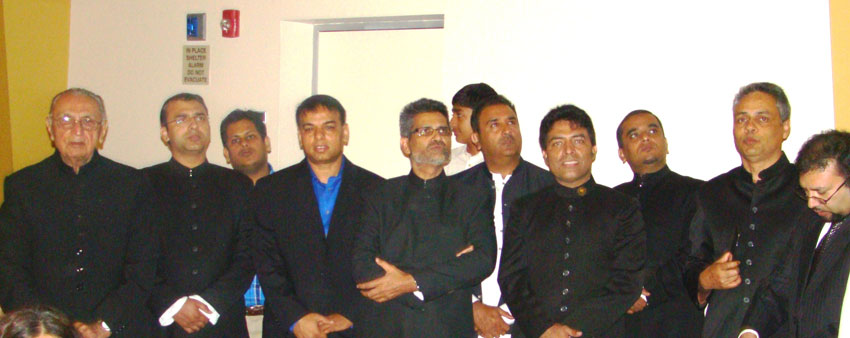
The final segment of Sir Syed Day is the International Mushaira (Urdu poetry recital) which continues to attract people from far and wide. The poets chosen for this AMU Mushaira represented a wide range of thoughts, moods and age ranges. The Nizamat (hosting) responsibility here was given to Tashie Zaheer (Bay Area) and the Sadarat (Presidency) of the segment to senior poet Naseer Turabi (Pakistan). Noteworthy Urdu Poets from the bay area started with the romance in Tarannnum of Misum Samar, the wishes and wonderment of Dr. Aifra Ahmed, the contemplation of Ahmar Shehwaar and the moving verses of Tashie Zaheer.
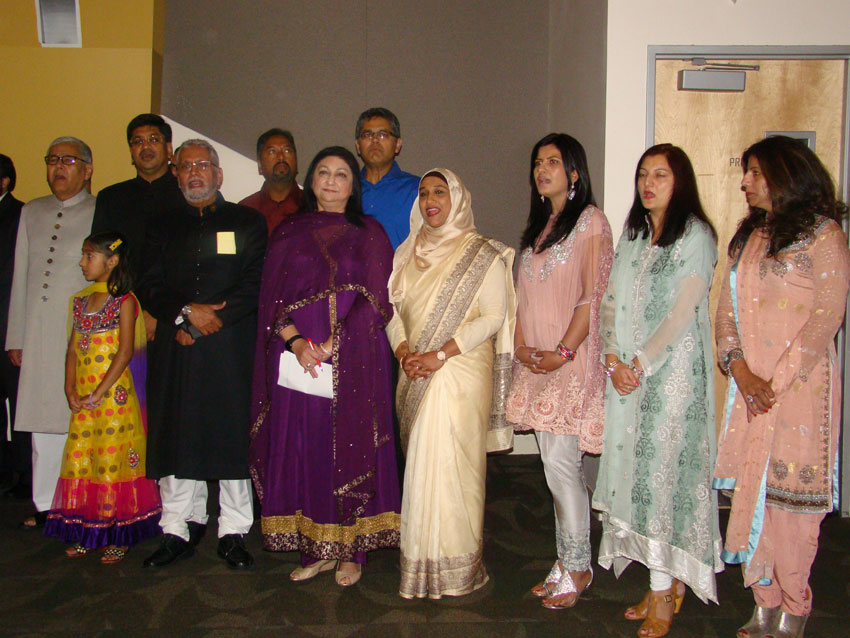
The guest poets this time were from both India and Pakistan started with Rakhshanda Naveed (Pakistan) who entertained us with both Nazm and Ghazal, (one for Independence Day) and Hasnain Jaleesi (Pakistan) provided much comic relief focusing on marriage, old age, one-way romancing. Shakeel Azmi (India) started off with some appreciative words for Sir Syed, incomplete lives, and some very powerful verses on how people live (Jeetey Hain). Iqbal Ashhar (India) next started with “Maar Daala” but his Nazam “Urdu hai Mera Naam” (Urdu is my name) literally stole the evening. And last but not least senior poet Naseer Turabi (Pakistan) closed the round with both romantic elegance and depth. He started off by sharing that his father was too was educated at AMU and that he was very happy to have visited there himself. And let us close with just a glimpse, an English translation of a couple of his lines delivered in Urdu about life’s journey: “Some were wounded by thorns, some even killed by the captivating beauty of the rose petals, and those who escaped this anguish (called love) were killed by their principles.”
